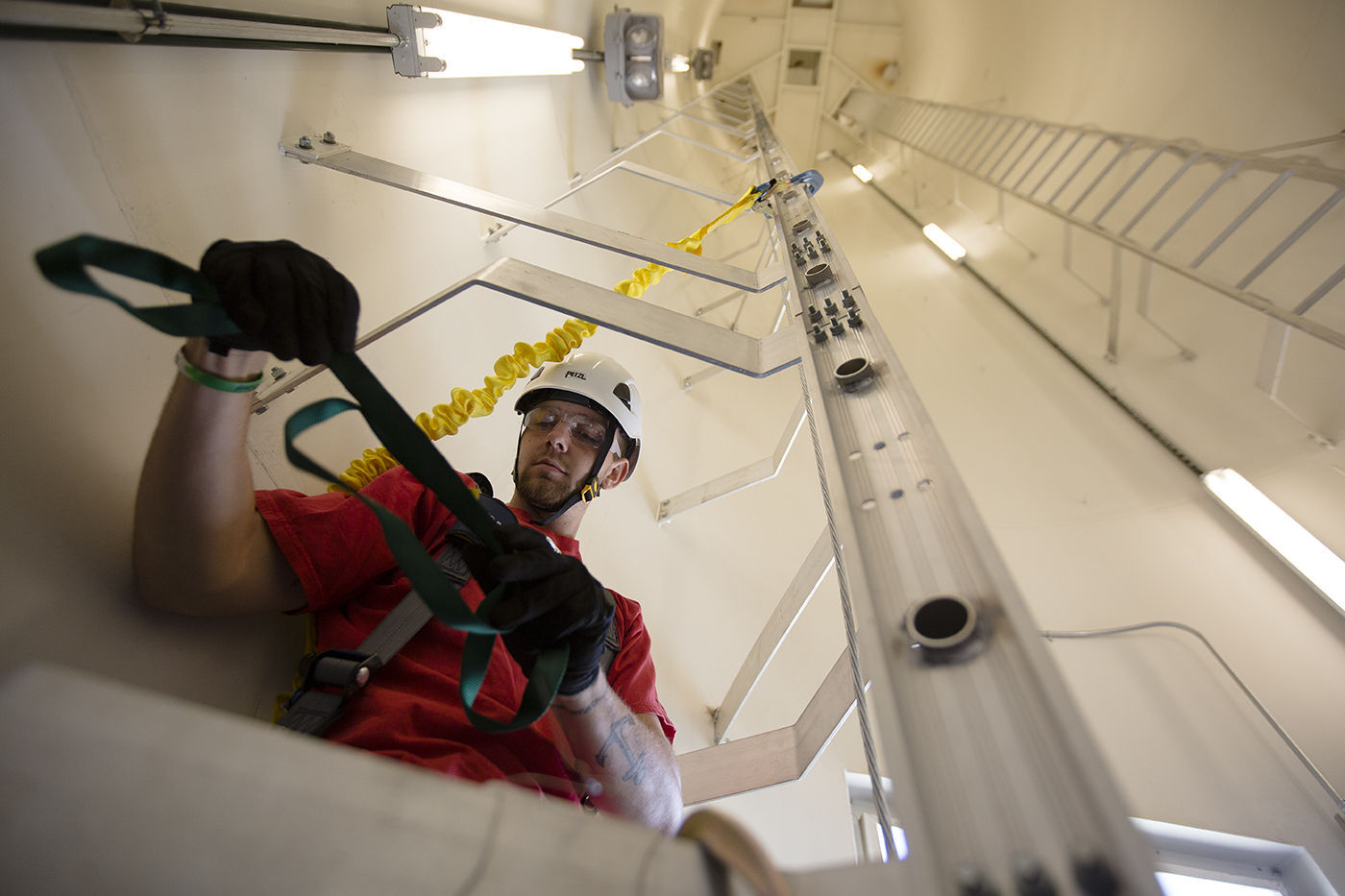Wyoming
Related: About this forumWhere will Wyoming's displaced fossil fuel workers go?
Nicole Pollack , Morgan Hughes Sep 5, 2021 Updated Sep 5, 2021

Tanner Hilderbrand practices using climbing equipment during an October 2017 wind turbine technician training course at Casper College. As Wyoming's traditional fossil fuel jobs diminish, more workers are moving into other fields, including those supporting renewable energy.
Josh Galemore file, Star-Tribune
There are times when Wyoming has been a really good place to work. The lows have always been low, but when the extractive industries of coal, oil and gas are booming, Wyoming is rich with high-paying jobs in the coal mines and oil fields.
But fossil fuels have fallen, and they aren’t rebounding. Even the verbiage has changed. It’s no longer a bust — it’s a permanent decline. Every year, those lucrative jobs are fewer and farther between.
Retraining of Wyoming’s energy workers has become a focal point for lawmakers and industry experts, who see potential for both calamity and possibility in the state’s changing job market.
***
As rising U.S. demand for low-carbon energy displaces the traditional fuels that underpin the state economy, the coal, oil and natural gas jobs that have sustained Wyoming families for generations, and the communities built around them, are at risk.
Many national clean energy advocates have called for an industry-wide transition of fossil fuel workers to similarly compensated jobs in the renewable sector. Experts say it’s not that simple — and argue that existing programs don’t do enough to help workers find jobs comparable to the ones they’re leaving behind.
{snip}
Many state leaders hope to turn Wyoming into a hub for emerging technologies like carbon capture and blue hydrogen, the type generated using natural gas. Still, a shift away from traditional fossil fuel use will likely require an economic restructuring away from the state’s past reliance on severance taxes from fossil fuel extraction, {Daniel Raimi, a fellow at environmental research nonprofit Resources for the Future and a lecturer in public policy at the University of Michigan} said.
“There’s no income tax in Wyoming,” he said. “There are relatively low taxes for people on other sources, and that’s because coal, oil and gas have been paying the way. But that can’t last forever. And so the sooner the state starts to diversify its economy and diversify its revenue sources, the better.”
Scrivener7
(52,810 posts)it employed around 38,000 people.
On the other hand, retail workers have lost well over 1.7 million jobs in the last 12 years.
That's 33,000 lost jobs in Wyoming coal vs. 1.7 million lost retail jobs.
For for some reason, these coal places get lots of press, and we fret and fret about the loss of these jobs. We wonder how we can support these people when they lose their jobs and how we can help them maintain their standard of living during the transition.
We never see the same coverage about lost retail jobs. They are mentioned in the press, but always in a "wow, look at that" or a "look how the world is changing" tone. Retraining retail workers is never a focal point for politicians, and no one really gives a shit about the calamity of that changing job market. No one is concerned about the families affected. No one mentions the communities at risk.
Guess why that is.
I have to say it: All my concern is used up on the million plus retail workers who have lost their jobs suddenly and with very little warning. I don't really care much about the handful of coal workers for whom the writing has been on the wall for a generation that their jobs were becoming obsolete, and who are being supported at every turn.
Here are links:
Lost retail jobs: (1.3 in the decade before 2019 https://www.businessinsider.com/retail-apocalypse-last-decade-timeline-2019-12?op=1 and the rest in the years since)
Lost coal jobs: https://en.wikipedia.org/wiki/Coal_mining_in_Wyoming
Merlot
(9,696 posts)As to your point about retail, I'd wager a guess that those jobs are held mostly by women. Plus, the oil industry, aside from getting massive gov't subsidies and not paying taxes, also holds incredible power and the media buys into that.
Let's ask gig workers how they feel about people who have a full time well-paying job with many protections in an industry that's both dying and killing the planet loosing said jobs.